It is almost dusk, and the West African heat is finally faltering. In Mlomp, a village in southern Senegal, dozens of teenagers in colorful jerseys are throwing each other to the ground to the rhythm of Afrobeats against a backdrop of palm trees.
It is a common sight across Senegal, where wrestling is a national sport and wrestlers are celebrated like rock stars. The local variation of wrestling, called laamb in Wolof, one of the national languages, has been part of village life for centuries.
Senegalese wrestle for entertainment and to celebrate special occasions. The professional version of the sport draws thousands to stadiums and can be a catapult to international stardom.
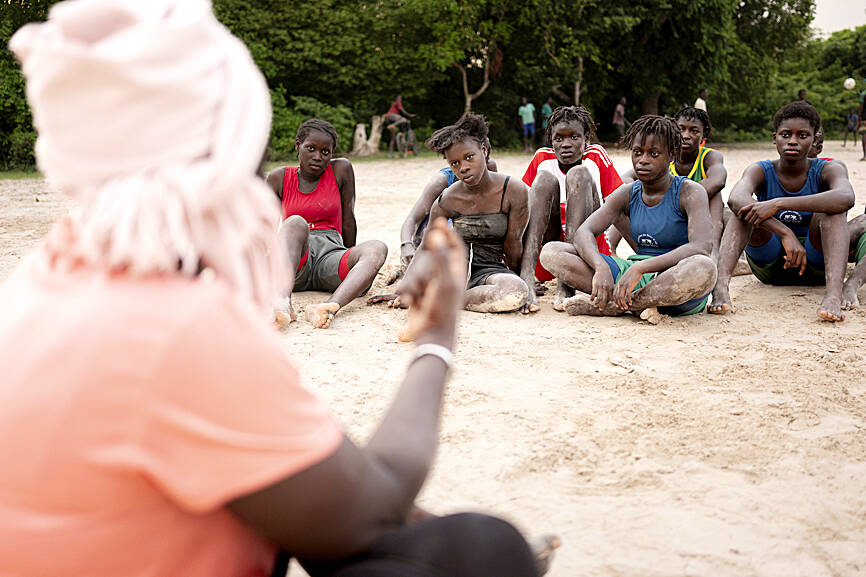
Photo: AP
Yet in most of the country, wrestling remains off-limits for women.
There is one exception. In the Casamance region, home to the Jola ethnic group, women traditionally wrestle alongside men. At a recent training session in Mlomp, most teenagers on the sandy ground were girls.
“It’s in our blood,” said coach Isabelle Sambou, 43, a two-time Olympian and nine-time African wrestling champion. “In our village, girls wrestle. My mum was a wrestler, my aunts were wrestlers.”

Photo: AP
However, once Jola women marry, they are expected to stop practicing and devote themselves to family life, considered the main duty of Senegalese women regardless of ethnicity or religion.
Sambou’s aunt, Awa Sy, now in her 80s, was the village champion in her youth, and said she would even take down some men.
“I liked wrestling because it made me feel strong. I stopped when I got married,” she said, standing outside her house nestled between rice fields and mangroves.
She did not question it at the time.
That has not been the case for her niece, who, despite her humble demeanor and small size, exudes strength and determination. She defied many barriers to become a professional athlete. As a teenager, Sambou was noticed by a professional wrestling coach at a competition during the annual Festival of the King of Oussouye, one of the few events accessible to women.
The coach said that she should try Olympic wrestling, which has a female national team, but she only agreed after her older brother convinced her to do it.
Wrestling brought Sambou, who did not finish primary school, to the Olympic Games in London and Rio de Janeiro, where she placed outside the medal contenders.
However, being a successful professional female athlete in a conservative society comes with a price.
“If you are a female wrestler, people are going to make fun of you,” Sambou said, recalling her experiences in parts of Senegal beyond her home region.
“When I walked around in shorts, people were saying: ‘Look, is it a woman or is it a boy?’” she said.
Others said that her body would change and she would no longer look like a woman.
Such things can “get to your head, but I tell myself: ‘They don’t know what they are talking about,’” Sambou said. “It’s in my blood, and it brought me where I am today.”
In 2016, facing her mid-30s, she decided to retire from professional sport and move back to her village.
“I thought it was the time to stop and think of something else, maybe find a job, start a family, but that hasn’t happened so far,” she said.
Instead, she focused on finding “future Isabelles.” After not fulfilling her dream of winning an Olympic medal, she hopes a girl she coaches can achieve that.
That mission has been complicated by a lack of resources. Women’s sport is often underfunded, especially in sub-Saharan Africa. Around Sambou’s village, there are no gyms where girls can do strength training. They do not have the special shoes used in Olympic wrestling, and instead train barefoot. They do not have mats, so they make do with sandy grounds.
Yet, at Africa’s wrestling youth championship in June in Senegal’s capital, Dakar, Sambou’s students won 10 medals, including six golds.
“Despite everything, they did magnificent work,” she said.
She has received little in return. Senegal has no pension system for retired professional athletes. Her lack of formal education complicates her career as a coach. She helps to coach the national wrestling team, both men and women, but on a voluntary basis. To get by, she works in a small shop and cleans people’s houses.
“I gave everything to wrestling, to my country,” she said. “Now I don’t have anything. I don’t even have my own house. It hurts a bit.”
She listed the countries she has visited, including the US and Switzerland, while sitting outside the home she shares with relatives. Her bedroom is decorated with a picture of Virgin Mary and posters celebrating her participation in championships — the only sign of her glorious past.
“It’s difficult to be a professional athlete. You have to leave everything behind,” she said. “And then you stop, and you come back here and you sit, without anything to do.”
Yet times are changing, and so is the perception of women in Senegalese society. These days, parents seek out Sambou and ask her to coach their children, regardless of their gender, even if it is still for free.
Sambou’s 17-year-old niece, Mame Marie Sambou, recently won a gold medal at the youth championship in Dakar. Her dream is to become a professional wrestler and compete internationally. The big test comes in two years when Senegal hosts the Youth Olympic Games, the first Olympic event ever organized on African soil.
“It’s my aunt who encouraged me to start wrestling,” she said. “When I started, many people were saying they have never seen a girl wrestle, but I never listened to them. I want to be like her.”
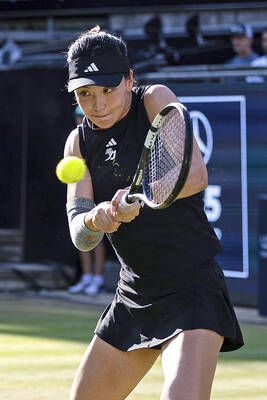
Twelve days after winning her second Grand Slam title at the French Open, Coco Gauff fell at the first hurdle on grass in Berlin on Thursday as beaten Paris finalist Aryna Sabalenka advanced to the quarter-finals. Recipient of a first round bye, American Gauff lost 6-3, 6-3 to Chinese qualifier Wang Xinyu as world number one Sabalenka beat Rebeka Masarova 6-2, 7-6 (8/6) in her second round tie. Winner of 10 main tour titles, including the US Open in 2023 and the WTA Finals last year, Gauff has yet to lift a trophy in a grass-court tournament. “After I won the first
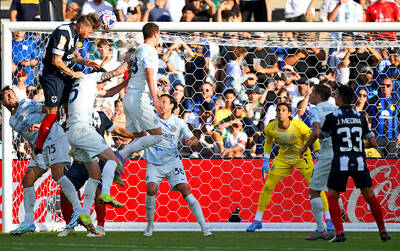
Sergio Ramos on Tuesday outfoxed two Inter players and artfully headed home the first goal for Monterrey at the FIFA Club World Cup. The 39-year-old Ramos slipped through the penalty area for the score just as he did for so many years in the shirts of Real Madrid and Spain’s national team, with whom he combined smarts, timing and physicality. Ramos’ clever goal and his overall defensive play at the Rose Bowl were major factors in Monterrey’s impressive 1-1 draw against the UEFA Champions League finalists in the clubs’ first match of the tournament. “There is always a joy to contribute to the
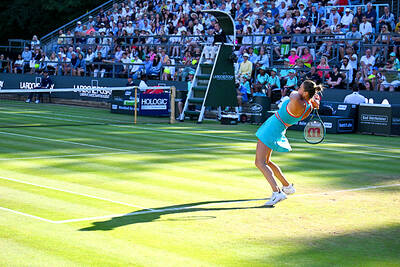
Top-ranked Aryna Sabalenka staged a “crazy comeback,” saving four match points before beating Elena Rybakina 7-6 (6), 3-6, 7-6 (6) in the quarter-finals of the Berlin Open on Friday. Sabalenka was 6-2 down in the final-set tie-breaker, but won six straight points to reach her eighth semi-final of the season. “Elena is a great player and we’ve had a lot of tough battles,” Sabalenka said. “I have no idea how I was able to win those last points. I think I just got lucky.” “I remember a long time ago when I was just starting, I won a lot of matches being down
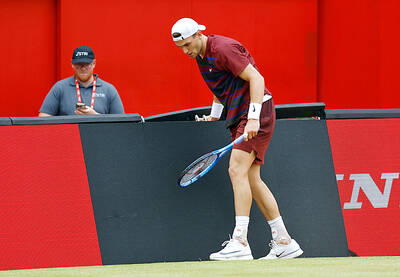
While British star Jack Draper spent the past week trying to find rhythm and comfort in his first grass tournament of the season at the Queen’s Club Championships in London, Jiri Lehecka on Saturday bulldozed everything in his path. After more than two furious hours of battle, their form was reflected in the final scoreline as Lehecka toppled a frustrated Draper, the second seed, 6-4, 4-6, 7-5 to reach the biggest final of his career, against Carlos Alcaraz. Lehecka is also the first Czech to reach the men’s title match at Queen’s since Ivan Lendl lifted the trophy in 1990. Draper, who